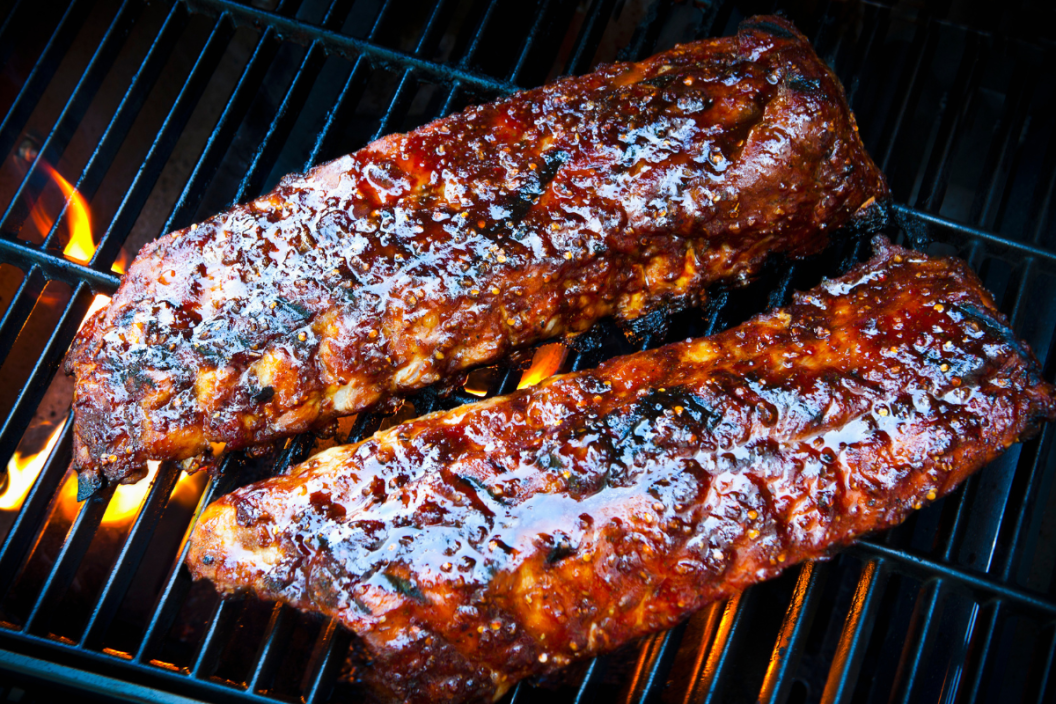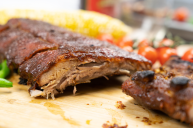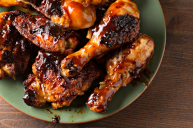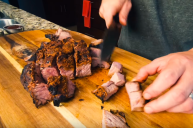When it comes to cooking ribs al fresco, many chefs and barbecue experts will insist that a smoker (and the low-and-slow cooking process associated with this tool) is necessary for tender meat and engaging smoky flavors. But if you don't have a smoker at the ready, we're happy to report that flavorful, juicy ribs can be prepared on a standard outdoor grill. "The benefit of the grill is that it's of course more accessible, and it makes for a faster cooking method because of the higher temperature," explains executive chef Cenobio Canalizo of Morgan's Barbecue in Brooklyn, New York.
To cook perfect ribs on the grill without overcooking the meat or risking a dangerous flare up, follow these tips from expert BBQ chefs.
Indirect heat is crucial to maintaining the tenderness of the ribs
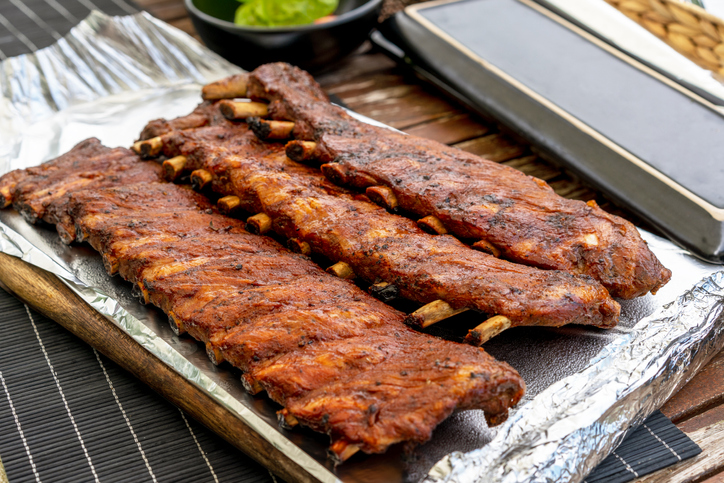
Cooking ribs on an open-fire grill comes with certain advantages-"When you grill ribs directly on the grill over an open flame, you get a chance to really get a nice hard sear, including a delicious char and crust on the ribs. Browning the ribs in such a way gives you the highly coveted crispness on the outside of the ribs and provides a great charred flavor, which creates an amazing contrast in texture of the juicy and fatty ribs," says executive chef David Rose of Omaha Steaks. However, the downside to the higher temperatures of a grill "is the possibility of overcharring (burning the ribs) or not rendering down the fat in the ribs all the way, resulting in them being chewy and potentially dry," Rose warns.
To solve this problem, Rose recommends "doing ribs over indirect heat in the grill." By "indirect heat", we mean shifting the ribs away from the grill flames themselves and allowing them to cook "low and slow" in a less-hot section of the grill. "You can bring out some really great natural flavors of the ribs and enhance the flavors" by adding wood chunks or chips to the grill, wrapped in a foil package. " With these ribs, you will get the smoke ring that is indicative of a proper smoke, and the fat will render down completely, resulting in a juicy rib. You should have browning or a light bark on the ribs." Before or after the ribs "smoke" on the grill, you can sear them over high heat to create that "bark", which provides "a toothier bite and a juicy tug to the meat."
A dry rub will provide better flavor to grilled ribs than a wet marinade
If you're braising ribs in the oven, you may read recipes advising you to use a "wet" marinade with oil, acid, and spices. But when it comes to grilled ribs, a "dry" rub of salt, pepper, and dried spices is a better bet. For one thing, a "wet" marinade (particularly one that involves oil) can present a fire hazard; if the marinade drips on the grill and catches fire, those flames may spread and put your entire grill apparatus at risk. If you need help binding the dry rub to the ribs, a light spread of mustard or ketchup over the meat can serve that purpose.
Also, a dry marinade will give your ribs a better flavor. "Thoroughly rub the [seasonings] on the ribs and let them sit uncovered in your fridge to 'air dry' for at least 24 hours. This will pull the salt and spices into the meat and help to dry the outside of the meat. When grilling or smoking, you want your protein to be dry; the drier outside layer will pick up the smoke and help get a nice crust on the protein," says executive chef Thomas Tuggle of 1799 Kitchen & Cocktails at The Harpeth Hotel in Franklin, Tennessee.
Smaller ribs with less fat content cook more easily on the grill
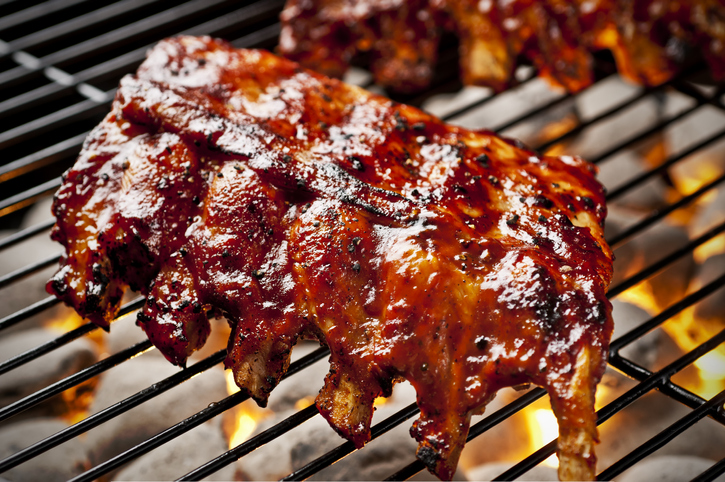
It's possible to cook any style of ribs on the grill. But if you're tight on time and want to prep your grilled ribs as quickly as possible, opt for smaller ribs with a lower amount of fat. "They take less time to cook and for the fat to render down, as opposed to fattier ribs," says Rose.
As far as specific rib cuts go, Rose suggests "LA style/flanken cut/Korean-style short ribs. They're cut really thin and are very well marbled. This is the only rib that I would suggest grilling entirely over a direct flame, because they cook so quickly and remain very tender."
If you choose to sauce the ribs after they come off of the grill, pay attention to your flavor balance
As we've explained, liquids and sauces aren't the safest items to cook on an open-flame grill. But if you're still craving saucy ribs, you can use your sauce of choice as a lacquer or a dipping condiment after the ribs cook through. When making a barbecue sauce, follow Rose's advice and pay attention to "salt, spice, sweetness, and acid. The salt can come from different types of salt [itself], soy sauce, etc. Spice can come in the form of different types of fresh, dried and powdered chilis/peppers or hot sauces. Sweetness can come from different types of sugar, honey, molasses, juice, fruit, soda, and so on. The acid can come from citrus or vinegar in the barbecue sauce or glaze. The acid will help cut through the fatty-rich mouth feel of the ribs."
Grilled St. Louis Pork Ribs
Ingredients
- 2 racks pork ribs 2.75 lbs each
- ¼ cup yellow mustard French's is preferred.
- ½ cup Spanish paprika
- 2 tbsps chili powder
- ½ cup black pepper
- ½ cup kosher salt
Instructions
- Add all dry ingredients to a small bowl and whisk to combine.
- Coat both sides of the rib racks with mustard.
- Use your hands to press ¼ cup of the dry seasoning to both sides of the rib racks. Reserve the rest of the seasoning for later use.
- Place the ribs on a medium-high grill and sear until both sides are charred (8-10 minutes on each side).
- Reduce the grill heat to low. Wrap the ribs in foil and shift the ribs away from the direct flames. Allow to cook for 2.5 hours.
- Remove ribs from the grill and rest for 15 minutes before serving.
